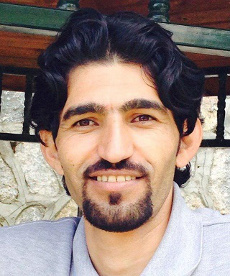Activism is the Right of Every Citizen: Ramin Hossein Panahi Given Death Sentence After Unfair Prosecution and Trial
 Ramin Hossein Panahi, a 24-year-old activist from Iranian Kurdistan currently being held at Sanandaj Prison, was tried by the Revolutionary Court in Sanandaj on charges of membership in the Komala Party on January 16, 2018. On January 25 – just nine days later – the court handed him a death sentence. The ruling has been sent for review by Branch 39 of Iran’s Supreme Court in Qom. The reason for this referral is not clear, a fact which has caused concern for Hossein Panahi’s family.
Ramin Hossein Panahi, a 24-year-old activist from Iranian Kurdistan currently being held at Sanandaj Prison, was tried by the Revolutionary Court in Sanandaj on charges of membership in the Komala Party on January 16, 2018. On January 25 – just nine days later – the court handed him a death sentence. The ruling has been sent for review by Branch 39 of Iran’s Supreme Court in Qom. The reason for this referral is not clear, a fact which has caused concern for Hossein Panahi’s family.
On June 23, 2017, Hossein Panahi and three other individuals were caught in an ambush by Revolutionary Guards. Hossein Panahi was taken into custody after being wounded by three bullets to the stomach and foot; the other three individuals were killed. Available reports indicate that he was held incommunicado for four months. Hossein Panahi spent more than 200 days being interrogated in solitary confinement, either in custody of the Revolutionary Guards’ Intelligence division or the Ministry of Intelligence, and was subjected to abuse and torture for more than eight months despite his need for medical attention after sustaining gunshot wounds. Hossein Panahi’s family reports that one of his kidneys became seriously infected, that he suffered memory loss owing to a Revolutionary Guard’s blow to his head, and that he was left in a generally poor medical condition.
Such treatment would contravene Iran’s own laws: Article 38 of the constitution forbids torture, and the country’s criminal code treats it as an offense. Moreover, confessions made under torture are not to be taken as credible in Iran’s judicial system.
According to the Hossein Panahi family’s lawyer, he had been traveling to Sanandaj to visit his ailing mother at the time of his ambush and arrest. Though Hossein Panahi himself maintains that he was not involved in an armed clash and was not bearing arms at the time, he sentenced to death for “armed insurrection” (“baghy”) despite a lack of clear evidence. Per Article 287 of Iran’s Islamic Penal Code, the crime of “baghy” is committed when a group has carried out an armed action against Iran’s Islamic government; those involved in such a group in an effectively active way are termed “bāghi.”
Hossein Panahi’s brother has stated that court officials did not allow Hossein Panahi to speak in court and did not permit his lawyer the opportunity to properly defend him. The trial was originally supposed to be conducted across several sessions; it was shortened to just one, and a death sentence was issued just over a week later.
Given such due process violations, Hossein Panahi’s brother believes that the case has strayed from proper legal procedure and that the death warrant was issued under the supervision of intelligence officials. The brother says that though the “baghy” charged on which the death sentence is based refers to a person who has participated in armed rebellion against the state, Hossein Panahi was a political activist who never partook in armed struggle was in fact not armed at the time of his arrest. According to this brother, it was the Ministry of Information and Revolutionary Guards who claimed that Hossein Panahi had borne arms – a claim denied repeatedly by Hossein Panahi himself.
The brother further elaborated that Hossein Panahi is a political and civil society activist and had been previously arrested at the age of 16 by the Ministry of Information, who subjected him to torture and coercion in order to elicit his cooperation. He was thus forced to flee the country for Iraqi Kurdistan. In his activist work, Hossein Panahi has fought for social justice, a free society, secularism, and democracy. Such activism is the right of every citizen. The Komala Party has, moreover, refrained from arm struggle for several years, according to the brother.
Emphasizing the difficulty of sending messages outside of prison, the brother stated that Hossein Panahi asked his mother in the course of an in-person visit to relate to international human rights activists that he rejects the court process which has sentenced him, that he is a political activist who has taken up civil society struggle as an example to other young Iranian Kurds, that he was forced to leave his home country, and that he returned to visit his elderly mother.
According to available information, Hossein Panahi’s other brother, Afshin Hossein Panahi – himself an environmental activist in Iranian Kurdistan unaffiliated with any political party – was also taken into custody following his brother’s arrest and spent two months under physical and mental torture. Interrogators pulled out his toenails and tried unsuccessfully to coerce him into recording a televised confession against his brother. The very same Revolutionary Court in Sanandaj which tried Ramin sentenced Afshin to eight and a half years’ prison time.





 My Interrogator Said: You Are An Ass, And Asses Do Not Merit Human Rights
My Interrogator Said: You Are An Ass, And Asses Do Not Merit Human Rights